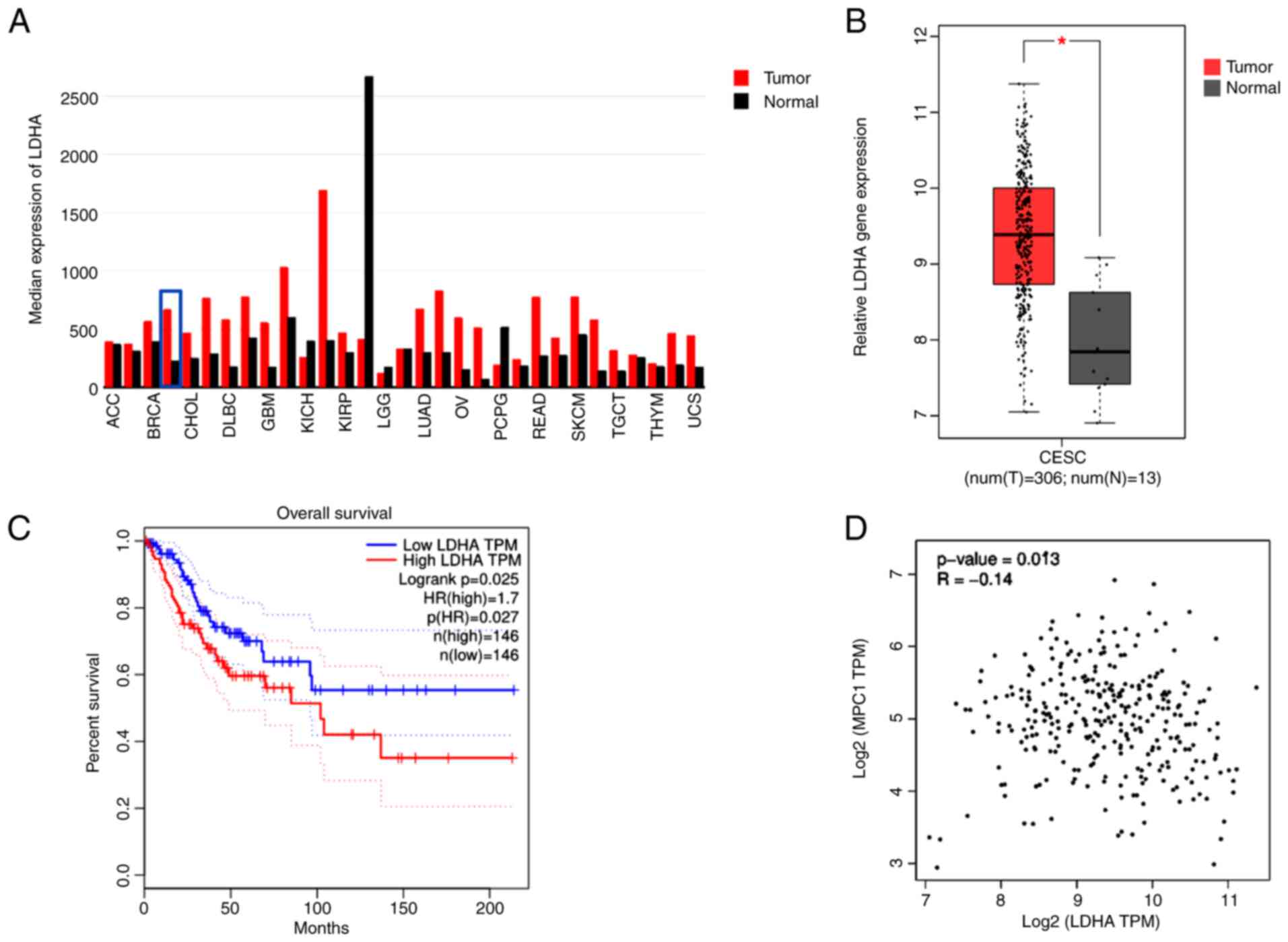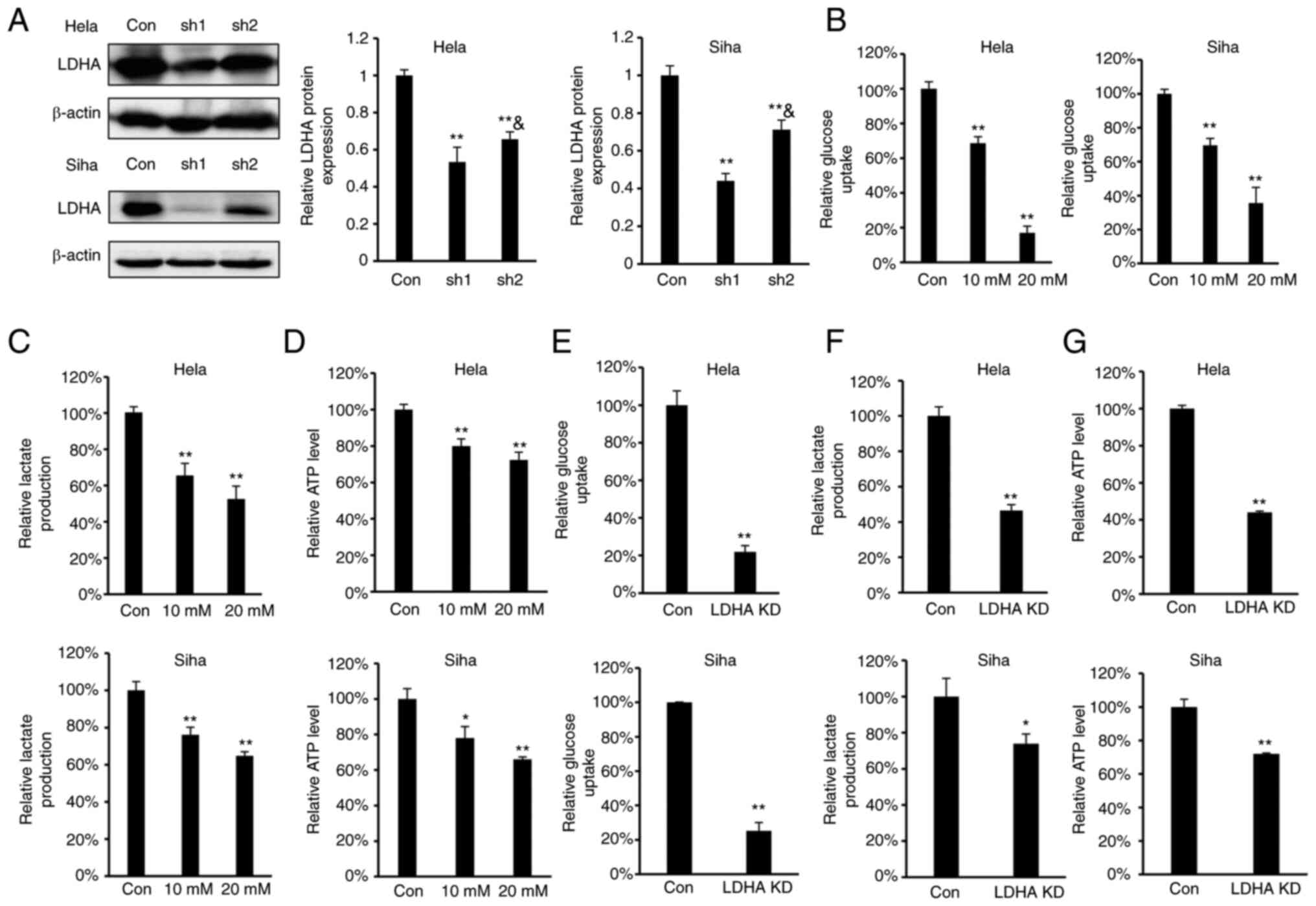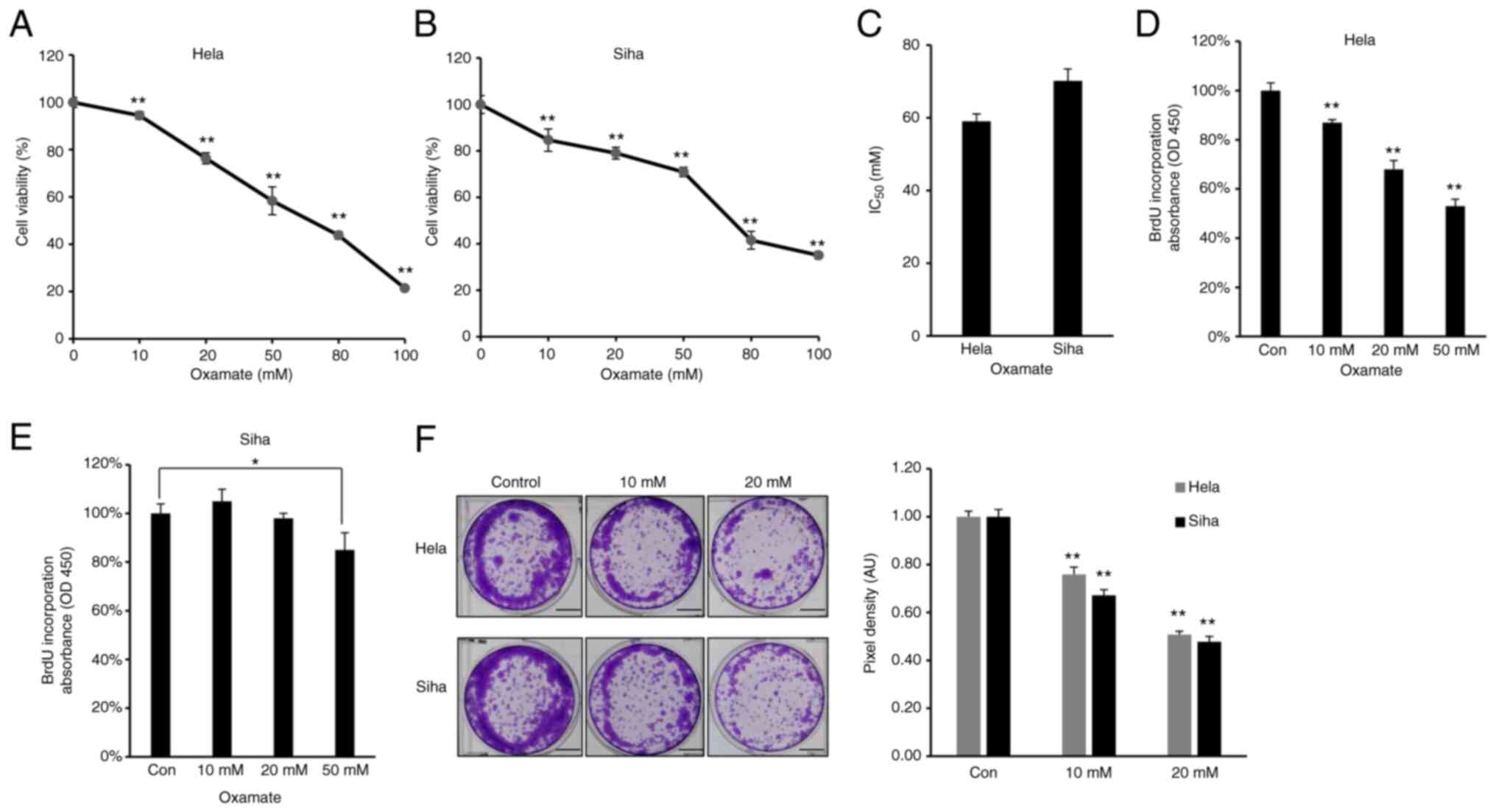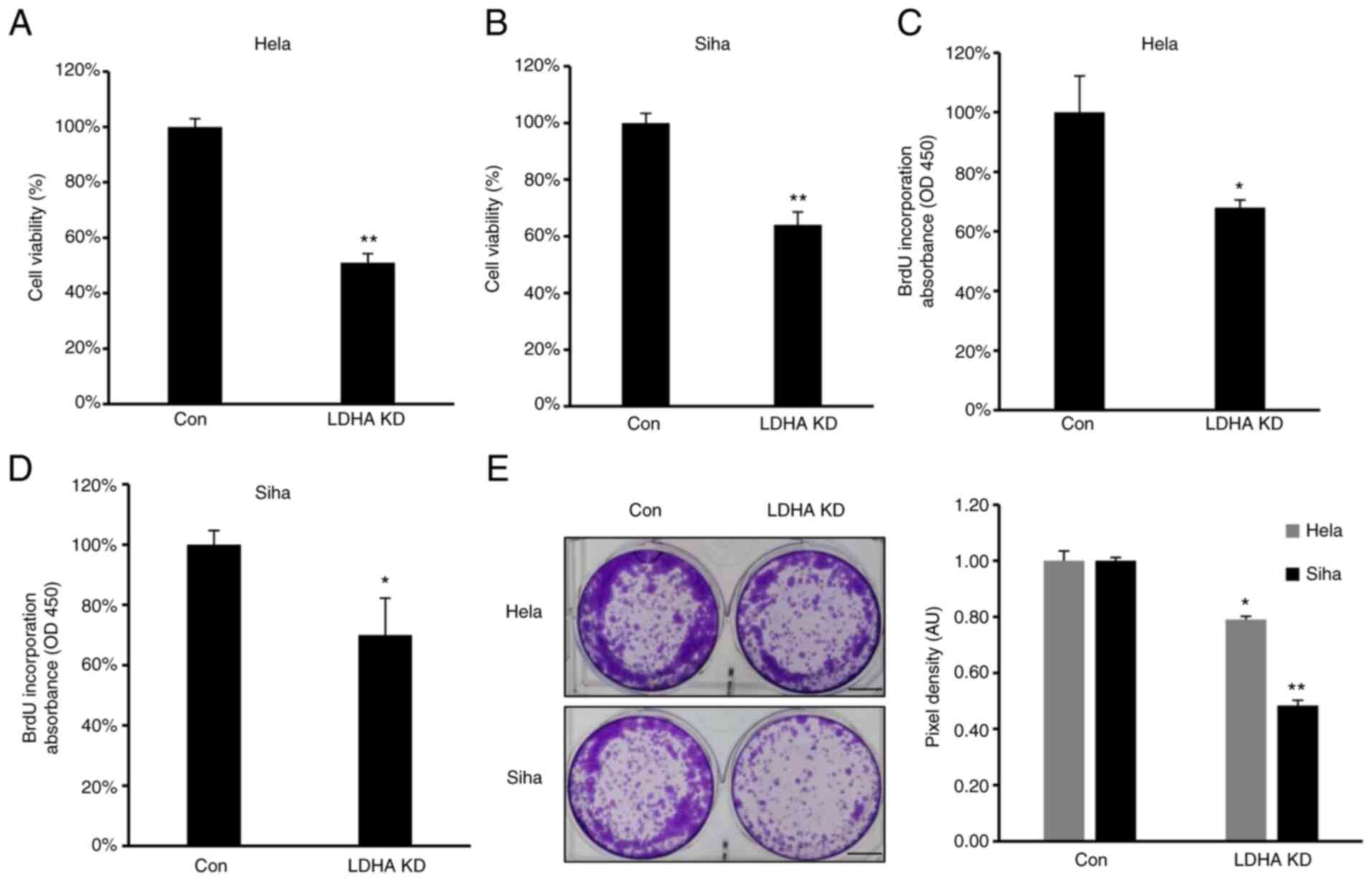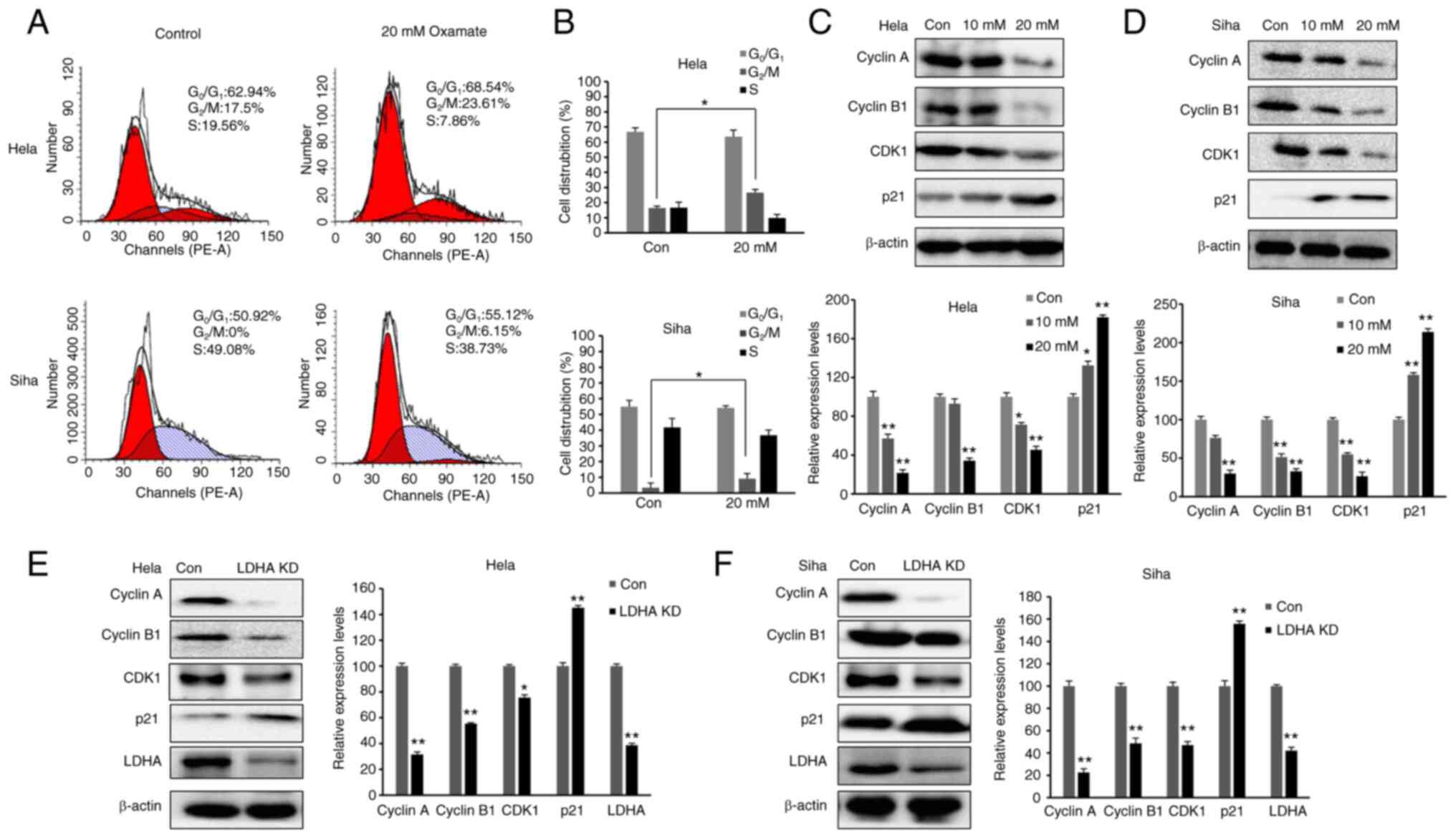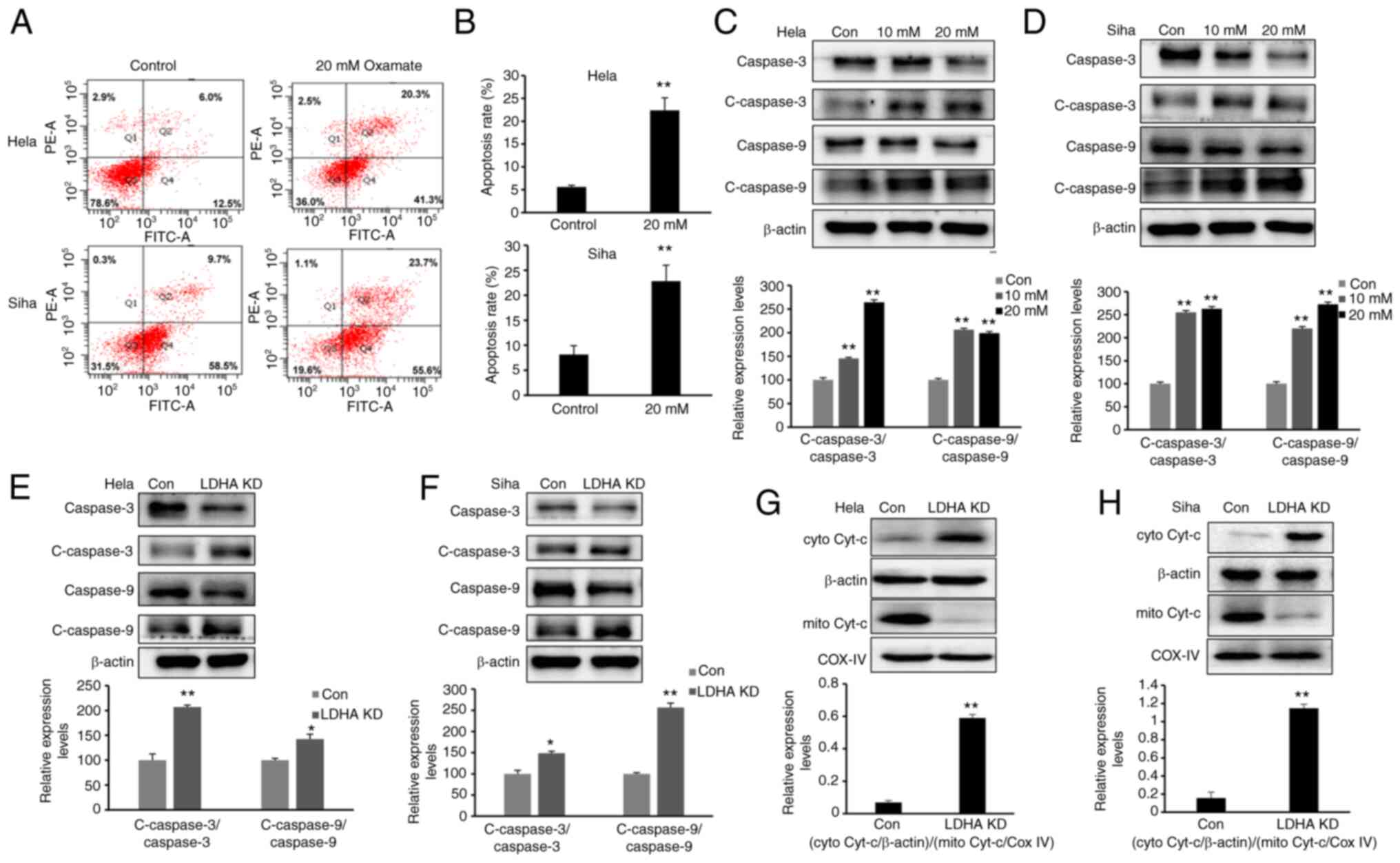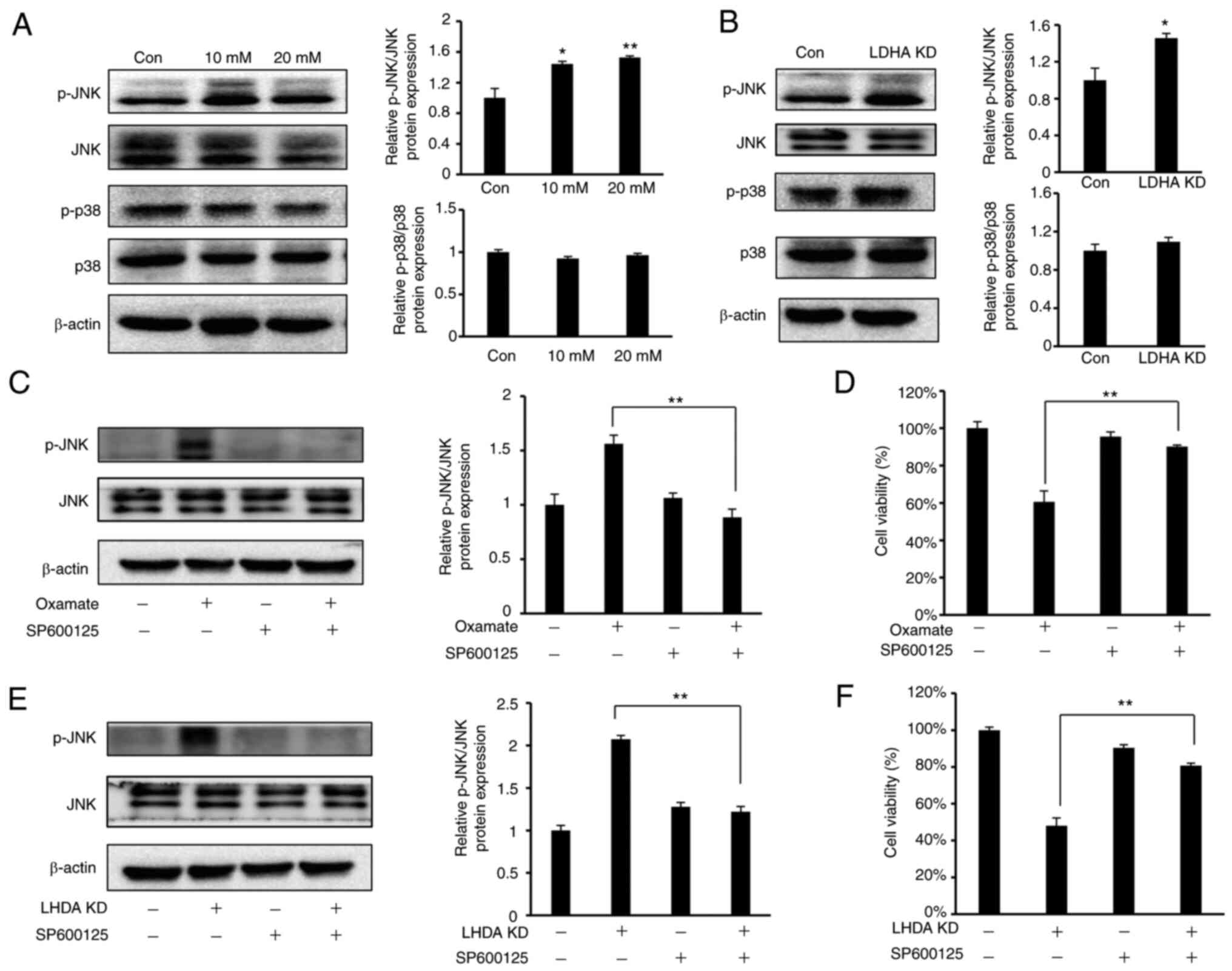|
1
|
Petrelli F, Ghidini A, Pedersini R,
Cabiddu M, Borgonovo K, Parati MC, Ghilardi M, Amoroso V, Berruti A
and Barni S: Comparative efficacy of palbociclib, ribociclib and
abemaciclib for ER+ metastatic breast cancer: An
adjusted indirect analysis of randomized controlled trials. Breast
Cancer Res Treat. 174:597–604. 2019. View Article : Google Scholar : PubMed/NCBI
|
|
2
|
De Cicco P, Catani MV, Gasperi V, Sibilano
M, Quaglietta M and Savini I: Nutrition and breast cancer: A
literature review on prevention, treatment and recurrence.
Nutrients. 11:15142019. View Article : Google Scholar : PubMed/NCBI
|
|
3
|
Siegel RL, Miller KD and Jemal A: Cancer
statistics, 2015. CA Cancer J Clin. 65:5–29. 2015. View Article : Google Scholar : PubMed/NCBI
|
|
4
|
Chen Q, Cao HZ and Zheng PS: LGR5 promotes
the proliferation and tumor formation of cervical cancer cells
through the Wnt/β-catenin signaling pathway. Oncotarget.
5:9092–9105. 2014. View Article : Google Scholar : PubMed/NCBI
|
|
5
|
Li XQ, Bai YL, Zhang DL, Jiao HS and He
RX: Euphornin reduces proliferation of human cervical
adenocarcinoma HeLa cells through induction of apoptosis and G2/M
cell cycle arrest. Onco Targets Ther. 11:4395–4405. 2018.
View Article : Google Scholar : PubMed/NCBI
|
|
6
|
Warburg O: On the origin of cancer cells.
Science. 123:309–314. 1956. View Article : Google Scholar : PubMed/NCBI
|
|
7
|
Zu XL and Guppy M: Cancer metabolism:
Facts, fantasy, and fiction. Biochem Biophys Res Commun.
313:459–465. 2004. View Article : Google Scholar : PubMed/NCBI
|
|
8
|
Pavlova NN and Thompson CB: The emerging
hallmarks of cancer metabolism. Cell Metab. 23:27–47. 2016.
View Article : Google Scholar : PubMed/NCBI
|
|
9
|
Potter M, Newport E and Morten KJ: The
Warburg effect: 80 Years on. Biochem Soc Trans. 44:1499–1505. 2016.
View Article : Google Scholar : PubMed/NCBI
|
|
10
|
Nicholas JA, Electricwala B, Lee LK and
Johnson KM: Burden of relapsing-remitting multiple sclerosis on
workers in the US: A cross-sectional analysis of survey data. BMC
Neurol. 19:2582019. View Article : Google Scholar : PubMed/NCBI
|
|
11
|
Moreno-Sánchez R, Rodríguez-Enríquez S,
Marín-Hernández A and Saavedra E: Energy metabolism in tumor cells.
FEBS J. 274:1393–1418. 2007. View Article : Google Scholar : PubMed/NCBI
|
|
12
|
Liu W, Yu X, Zhou L, Li J, Li M, Li W and
Gao F: Sinomenine inhibits non-small cell lung cancer via
downregulation of hexokinases II-mediated aerobic glycolysis. Onco
Targets Ther. 13:3209–3221. 2020. View Article : Google Scholar : PubMed/NCBI
|
|
13
|
Tamgüney T, Zhang C, Fiedler D, Shokat K
and Stokoe D: Analysis of 3-phosphoinositide-dependent kinase-1
signaling and function in ES cells. Exp Cell Res. 314:2299–2312.
2008. View Article : Google Scholar : PubMed/NCBI
|
|
14
|
Xie H, Valera VA, Merino MJ, Amato AM,
Signoretti S, Linehan WM, Sukhatme VP and Seth P: LDH-A inhibition,
a therapeutic strategy for treatment of hereditary leiomyomatosis
and renal cell cancer. Mol Cancer Ther. 8:626–635. 2009. View Article : Google Scholar : PubMed/NCBI
|
|
15
|
Pelicano H, Martin DS, Xu RH and Huang P:
Glycolysis inhibition for anticancer treatment. Oncogene.
25:4633–4646. 2006. View Article : Google Scholar : PubMed/NCBI
|
|
16
|
Choi YJ, Jeon JH and Oh JW: Critical
combination of initial markers for predicting refractory Mycoplasma
pneumoniae pneumonia in children: A case control study. Respir Res.
20:1932019. View Article : Google Scholar : PubMed/NCBI
|
|
17
|
Drent M, Cobben NA, Henderson RF, Wouters
EF and van Dieijen-Visser M: Usefulness of lactate dehydrogenase
and its isoenzymes as indicators of lung damage or inflammation.
Eur Respir J. 9:1736–1742. 1996. View Article : Google Scholar : PubMed/NCBI
|
|
18
|
Jiang W, Zhou F, Li N, Li Q and Wang L:
FOXM1-LDHA signaling promoted gastric cancer glycolytic phenotype
and progression. Int J Clin Exp Pathol. 8:6756–6763.
2015.PubMed/NCBI
|
|
19
|
Maftouh M, Avan A, Sciarrillo R, Granchi
C, Leon LG, Rani R, Funel N, Smid K, Honeywell R, Boggi U, et al:
Synergistic interaction of novel lactate dehydrogenase inhibitors
with gemcitabine against pancreatic cancer cells in hypoxia. Br J
Cancer. 110:172–182. 2014. View Article : Google Scholar : PubMed/NCBI
|
|
20
|
Shi M, Cui J, Du J, Wei D, Jia Z, Zhang J,
Zhu Z, Gao Y and Xie K: A novel KLF4/LDHA signaling pathway
regulates aerobic glycolysis in and progression of pancreatic
cancer. Clin Cancer Res. 20:4370–4380. 2014. View Article : Google Scholar : PubMed/NCBI
|
|
21
|
Sheng SL, Liu JJ, Dai YH, Sun XG, Xiong XP
and Huang G: Knockdown of lactate dehydrogenase A suppresses tumor
growth and metastasis of human hepatocellular carcinoma. FEBS J.
279:3898–3910. 2012. View Article : Google Scholar : PubMed/NCBI
|
|
22
|
Zhai X, Yang Y, Wan J, Zhu R and Wu Y:
Inhibition of LDH-A by oxamate induces G2/M arrest, apoptosis and
increases radiosensitivity in nasopharyngeal carcinoma cells. Oncol
Rep. 30:2983–2991. 2013. View Article : Google Scholar : PubMed/NCBI
|
|
23
|
Zhao YH, Zhou M, Liu H, Ding Y, Khong HT,
Yu D, Fodstad O and Tan M: Upregulation of lactate dehydrogenase A
by ErbB2 through heat shock factor 1 promotes breast cancer cell
glycolysis and growth. Oncogene. 28:3689–3701. 2009. View Article : Google Scholar : PubMed/NCBI
|
|
24
|
Le A, Cooper CR, Gouw AM, Dinavahi R,
Maitra A, Deck LM, Royer RE, Vander Jagt DL, Semenza GL and Dang
CV: Inhibition of lactate dehydrogenase A induces oxidative stress
and inhibits tumor progression. Proc Natl Acad Sci USA.
107:2037–2042. 2010. View Article : Google Scholar : PubMed/NCBI
|
|
25
|
Wang ZY, Loo TY, Shen JG, Wang N, Wang DM,
Yang DP, Mo SL, Guan XY and Chen JP: LDH-A silencing suppresses
breast cancer tumorigenicity through induction of oxidative stress
mediated mitochondrial pathway apoptosis. Breast Cancer Res Treat.
131:791–800. 2012. View Article : Google Scholar : PubMed/NCBI
|
|
26
|
Zhou M, Zhao Y, Ding Y, Liu H, Liu Z,
Fodstad O, Riker AI, Kamarajugadda S, Lu J, Owen LB, et al: Warburg
effect in chemosensitivity: Targeting lactate dehydrogenase-A
re-sensitizes taxol-resistant cancer cells to taxol. Mol Cancer.
9:332010. View Article : Google Scholar : PubMed/NCBI
|
|
27
|
Zhao Y, Liu H, Liu Z, Ding Y, Ledoux SP,
Wilson GL, Voellmy R, Lin Y, Lin W, Nahta R, et al: Overcoming
trastuzumab resistance in breast cancer by targeting dysregulated
glucose metabolism. Cancer Res. 71:4585–4597. 2011. View Article : Google Scholar : PubMed/NCBI
|
|
28
|
Novoa WB, Winer AD, Glaid AJ and Schwert
GW: Lactic dehydrogenase. V. Inhibition by oxamate and by oxalate.
J Biol Chem. 234:1143–1148. 1959. View Article : Google Scholar : PubMed/NCBI
|
|
29
|
Ramanathan A, Wang C and Schreiber SL:
Perturbational profiling of a cell-line model of tumorigenesis by
using metabolic measurements. Proc Natl Acad Sci USA.
102:5992–5997. 2005. View Article : Google Scholar : PubMed/NCBI
|
|
30
|
Tang Z, Li C, Kang B, Gao G, Li C and
Zhang Z: GEPIA: A web server for cancer and normal gene expression
profiling and interactive analyses. Nucleic Acids Res. 45:W98–W102.
2017. View Article : Google Scholar : PubMed/NCBI
|
|
31
|
Dong Y, Stewart T, Bai L, Li X, Xu T,
Iliff J, Shi M, Zheng D, Yuan L, Wei T, et al: Coniferaldehyde
attenuates Alzheimer's pathology via activation of Nrf2 and its
targets. Theranostics. 10:179–200. 2020. View Article : Google Scholar : PubMed/NCBI
|
|
32
|
Zhang W, Gong J, Ding L, Zhang Z, Pan X,
Chen X, Guo W, Zhang X, Yang X, Peng G, et al: Functional
validation of a human GLUD2 variant in a murine model of
Parkinson's disease. Cell Death Dis. 11:8972020. View Article : Google Scholar : PubMed/NCBI
|
|
33
|
Ma WQ, Sun XJ, Zhu Y and Liu NF: PDK4
promotes vascular calcification by interfering with autophagic
activity and metabolic reprogramming. Cell Death Dis. 11:9912020.
View Article : Google Scholar : PubMed/NCBI
|
|
34
|
Zhang WJ, Song ZB, Bao YL, Li WL, Yang XG,
Wang Q, Yu CL, Sun LG, Huang YX and Li YX: Periplogenin induces
necroptotic cell death through oxidative stress in HaCaT cells and
ameliorates skin lesions in the TPA- and IMQ-induced psoriasis-like
mouse models. Biochem Pharmacol. 105:66–79. 2016. View Article : Google Scholar : PubMed/NCBI
|
|
35
|
Tan WX, Xu TM, Zhou ZL, Lv XJ, Liu J,
Zhang WJ and Cui MH: TRP14 promotes resistance to cisplatin by
inducing autophagy in ovarian cancer. Oncol Rep. 42:1343–1354.
2019.PubMed/NCBI
|
|
36
|
An J, Zhang Y, He J, Zang Z, Zhou Z, Pei
X, Zheng X, Zhang W, Yang H and Li S: Lactate dehydrogenase A
promotes the invasion and proliferation of pituitary adenoma. Sci
Rep. 7:47342017. View Article : Google Scholar : PubMed/NCBI
|
|
37
|
Yang Y, Su D, Zhao L, Zhang D, Xu J, Wan
J, Fan S and Chen M: Different effects of LDH-A inhibition by
oxamate in non-small cell lung cancer cells. Oncotarget.
5:11886–11896. 2014. View Article : Google Scholar : PubMed/NCBI
|
|
38
|
Dayton TL, Jacks T and Vander Heiden MG:
PKM2, cancer metabolism, and the road ahead. EMBO Rep.
17:1721–1730. 2016. View Article : Google Scholar : PubMed/NCBI
|
|
39
|
Malsy M, Gebhardt K, Gruber M, Wiese C,
Graf B and Bundscherer A: Effects of ketamine, s-ketamine, and MK
801 on proliferation, apoptosis, and necrosis in pancreatic cancer
cells. BMC Anesthesiol. 15:1112015. View Article : Google Scholar : PubMed/NCBI
|
|
40
|
Yim NH, Kim A, Liang C, Cho WK and Ma JY:
Guibitang, a traditional herbal medicine, induces apoptotic death
in A431 cells by regulating the activities of mitogen-activated
protein kinases. BMC Complement Altern Med. 14:3442014. View Article : Google Scholar : PubMed/NCBI
|
|
41
|
Xie P, Horio F, Fujii I, Zhao J, Shinohara
M and Matsukura M: A novel polysaccharide derived from algae
extract inhibits cancer progression via JNK, not via the p38 MAPK
signaling pathway. Int J Oncol. 52:1380–1390. 2018.PubMed/NCBI
|
|
42
|
Hao D, Li Y, Shi J and Jiang J: Baicalin
alleviates chronic obstructive pulmonary disease through regulation
of HSP72-mediated JNK pathway. Mol Med. 27:532021. View Article : Google Scholar : PubMed/NCBI
|
|
43
|
Netea-Maier RT, Smit JWA and Netea MG:
Metabolic changes in tumor cells and tumor-associated macrophages:
A mutual relationship. Cancer Lett. 413:102–109. 2018. View Article : Google Scholar : PubMed/NCBI
|
|
44
|
Lu Y, Cheng J, Cai W, Zhuo H, Wu G and Cai
J: Inhibition of circRNA circVPS33B reduces warburg effect and
tumor growth through regulating the miR-873-5p/HNRNPK axis in
infiltrative gastric cancer. Onco Targets Ther. 14:3095–3108. 2021.
View Article : Google Scholar : PubMed/NCBI
|
|
45
|
Ždralević M, Brand A, Di Ianni L, Dettmer
K, Reinders J, Singer K, Peter K, Schnell A, Bruss C, Decking SM,
et al: Double genetic disruption of lactate dehydrogenases A and B
is required to ablate the ‘Warburg effect’ restricting tumor growth
to oxidative metabolism. J Biol Chem. 293:15947–15961. 2018.
View Article : Google Scholar : PubMed/NCBI
|
|
46
|
Miao P, Sheng S, Sun X, Liu J and Huang G:
Lactate dehydrogenase A in cancer: A promising target for diagnosis
and therapy. IUBMB Life. 65:904–910. 2013. View Article : Google Scholar : PubMed/NCBI
|
|
47
|
Lu QY, Zhang L, Yee JK, Go VW and Lee WN:
Metabolic consequences of LDHA inhibition by epigallocatechin
gallate and oxamate in MIA PaCa-2 pancreatic cancer cells.
Metabolomics. 11:71–80. 2015. View Article : Google Scholar : PubMed/NCBI
|
|
48
|
McCommis KS, Hodges WT, Bricker DK,
Wisidagama DR, Compan V, Remedi MS, Thummel CS and Finck BN: An
ancestral role for the mitochondrial pyruvate carrier in
glucose-stimulated insulin secretion. Mol Metab. 5:602–614. 2016.
View Article : Google Scholar : PubMed/NCBI
|
|
49
|
Li X, Han G, Li X, Kan Q, Fan Z, Li Y, Ji
Y, Zhao J, Zhang M, Grigalavicius M, et al: Mitochondrial pyruvate
carrier function determines cell stemness and metabolic
reprogramming in cancer cells. Oncotarget. 8:46363–46380. 2017.
View Article : Google Scholar : PubMed/NCBI
|
|
50
|
Li Y, Li X, Kan Q, Zhang M, Li X, Xu R,
Wang J, Yu D, Goscinski MA, Wen JG, et al: Mitochondrial pyruvate
carrier function is negatively linked to Warburg phenotype in vitro
and malignant features in esophageal squamous cell carcinomas.
Oncotarget. 8:1058–1073. 2017. View Article : Google Scholar : PubMed/NCBI
|
|
51
|
Hanahan D and Weinberg RA: Hallmarks of
cancer: The next generation. Cell. 144:646–674. 2011. View Article : Google Scholar : PubMed/NCBI
|
|
52
|
Nossol C, Landgraf P, Kahlert S, Oster M,
Isermann B, Dieterich DC, Wimmers K, Dänicke S and Rothkötter HJ:
Deoxynivalenol affects cell metabolism and increases protein
biosynthesis in intestinal porcine epithelial cells (IPEC-J2): DON
increases protein biosynthesis. Toxins (Basel). 10:4642018.
View Article : Google Scholar : PubMed/NCBI
|
|
53
|
Pal HC and Katiyar SK: Cryptolepine, a
plant alkaloid, inhibits the growth of non-melanoma skin cancer
cells through inhibition of topoisomerase and induction of DNA
damage. Molecules. 21:17582016. View Article : Google Scholar : PubMed/NCBI
|
|
54
|
Lindqvist A, van Zon W, Karlsson Rosenthal
C and Wolthuis RM: Cyclin B1-Cdk1 activation continues after
centrosome separation to control mitotic progression. PLoS Biol.
5:e1232007. View Article : Google Scholar : PubMed/NCBI
|
|
55
|
Hung WY, Huang KH, Wu CW, Chi CW, Kao HL,
Li AF, Yin PH and Lee HC: Mitochondrial dysfunction promotes cell
migration via reactive oxygen species-enhanced β5-integrin
expression in human gastric cancer SC-M1 cells. Biochim Biophys
Acta. 1820:1102–1110. 2012. View Article : Google Scholar : PubMed/NCBI
|
|
56
|
Guo Y, Zhang W, Yan YY, Ma CG, Wang X,
Wang C and Zhao JL: Triterpenoid pristimerin induced HepG2 cells
apoptosis through ROS-mediated mitochondrial dysfunction. J BUON.
18:477–485. 2013.PubMed/NCBI
|
|
57
|
Bartz RR, Suliman HB and Piantadosi CA:
Redox mechanisms of cardiomyocyte mitochondrial protection. Front
Physiol. 6:2912015. View Article : Google Scholar : PubMed/NCBI
|
|
58
|
Jiang Q, Liu G, Wang X, Hou Y, Duan Y, Wu
G, Yin Y and Yao K: Mitochondrial pathway is involved in the
protective effects of alpha-ketoglutarate on hydrogen peroxide
induced damage to intestinal cells. Oncotarget. 8:74820–74835.
2017. View Article : Google Scholar : PubMed/NCBI
|
|
59
|
Ades F and Metzger-Filho O: Targeting the
cellular signaling: BRAF inhibition and beyond for the treatment of
metastatic malignant melanoma. Dermatol Res Pract. 2012:2591702012.
View Article : Google Scholar : PubMed/NCBI
|















